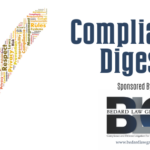I’m thrilled to announce that Bedard Law Group is the new sponsor for the Compliance Digest. Bedard Law Group, P.C. – Compliance Support – Defense Litigation – Nationwide Complaint Management – Turnkey Speech Analytics. And Our New BLG360 Program – Your Low Monthly Retainer Compliance Solution. Visit www.bedardlawgroup.com, email John H. Bedard, Jr., or call (678) 253-1871.

Every week, AccountsRecovery.net brings you the most important news in the industry. But, with compliance-related articles, context is king. That’s why the brightest and most knowledgable compliance experts are sought to offer their perspectives and insights into the most important news of the day. Read on to hear what the experts have to say this week.
Judge Grants MTD in FDCPA Case Over Argument that Defendant Should Have Known Plaintiff was Represented by Attorney
In a case that was defended by Patrick Watts at Martin Lyons Watts Morgan, a District Court judge in Missouri has granted a defendant’s motion to dismiss a Fair Debt Collection Practices Act case after it was sued because it should have known that a previous collector had been notified that the plaintiff was represented by an attorney, ruling that the plaintiff’s reliance on a “chain of speculation” is not enough to keep the case going. More details here.
WHAT THIS MEANS, FROM LAUREN BURNETTE OF MESSER STRICKLER BURNETTE: The march toward requiring consumers to plead hard facts continues. The FDCPA has long required a debt collector to have actual knowledge of a consumer’s representation by counsel in order for the consumer to plead a viable violation of Section 1692c(a)(2). Consumer plaintiffs have used an array of arguments to try to side-step the “actual knowledge” requirement, including the “information and belief” approach used in this case. As the judge made clear, this is just not enough. Defendants facing similar claims of improperly contacting represented consumers should do their best to ignore the noise. If a consumer pleads that a defendant took action “pursuant to industry practices” or “as a matter of custom,” or “as a matter of standard conduct,” it’s likely because the consumer can’t plead their claim with the required degree of specificity. This opinion is a good example of when such push-back might be appropriate.
THE COMPLIANCE DIGEST IS SPONSORED BY:

State Court Judge Denies Certification, Dismisses FDCPA Suit for Lack of Standing
In a case that was defendant by Dale Golden at Golden Scaz Gagain, a state court judge in Wisconsin has denied a plaintiff’s motion to certify a class action and dismissed a Fair Debt Collection Practices Act case because the plaintiff lacked standing to sue. Getting a dismissal in state court because a plaintiff did not suffer a concrete injury is a big win for the industry as it fights more suits being filed in state courts because of relaxed standing requirements. More details here.
WHAT THIS MEANS, FROM BRIT SUTTELL OF BARRON & NEWBURGER: This case is an important one for the industry as more FDCPA cases are being filed in state courts. While the standing jurisprudence will not be in the same in every state, each victory is important. The focus for many of these cases, as it was in this case, is going to be consumer harm (or lack thereof). The Wisconsin court found that since the consumer did not suffer any “pecuniary loss,” she lacked standing. Although this is a lower court victory, the decision relies on Wisconsin State Supreme Court precedent. In addition to this welcome victory, the Indiana State Supreme Court also recently articulated the standing standard for that jurisdiction. The industry appears to be doing a good job of educating the judges in each of these jurisdictions that “consumer harm” must be a key element for FDCPA cases.
Judge Grants MTD in FDCPA Case Over Settlement Offer in Letter
Score one for the least sophisticated debtor. A District Court judge in New Jersey has granted a defendant’s motion to dismiss after it was sued for allegedly violating the Fair Debt Collection Practices Act when it sent a letter to the plaintiff offering to delete the debt tradeline if the plaintiff made two payments equaling 45% of the balance owed. More details here.
WHAT THIS MEANS, FROM RICK PERR OF KAUFMAN DOLOWICH & VOLUCK: The audience for your letters is less about the actual consumer who receives them than it is about what a plaintiff’s lawyer or a judge thinks about the letter. The reason is that a plaintiff’s lawyer is going to read the letter in an effort to twist a possible meaning to further a consumer lawsuit regardless of how her client understands the letter. In this case, what appears to be a straight-forward letter giving a consumer a very generous settlement offer and deletion of the tradeline upon final payment instead is purportedly confusing as to whether the final payment is the settlement payment or only a payment in full. This is purely a lawyer’s case and not a situation in which an actual consumer is confounded. Fortunately, the trial court refused to believe that the plain meaning of the letter meant anything other than what was intended – pay the settlement balance and receive tradeline deletion. The lesson here is to make sure you have a lawyer review all of your letters to ensure another lawyer can only infer a single meaning.
Briefs Filed in Support of Group Suing CFPB Over Funding Structure
Amicus briefs were due this week in support of the group suing the Consumer Financial Protection Bureau over whether the funding structure that gives the CFPB its budget is constitutional, and a number of groups, including ACA International, former Acting Director Mick Mulvaney, 132 current Members of Congress, 21 former Members of Congress, and 27 state Attorneys General — to name just a few — all filed briefs. More details here.
WHAT THIS MEANS, FROM VIRGINIA BELL FLYNN OF TROUTMAN PEPPER: The Supreme Court recently granted certiorari to review the Fifth Circuit’s ruling in Community Financial Services Association of America, Ltd., et al. v. CFPB, 51 F.4th 616 (5th Cir. 2022). For background, the Fifth Circuit held that the statute providing funding to the Consumer Financial Protection Bureau (“CFPB”), 12 U.S.C. § 5497, violates the Appropriations Clause of the Constitution, and vacated the Payday Lending Rule, which was promulgated using the CFPB’s unconstitutional financial structure.
As oral argument approaches, several amicus briefs have been filed in support of the Community Financial Services of America’s (CFSA) position that the Supreme Court should uphold the Fifth Circuit’s ruling. Of particular interest is the amicus brief filed by the CFPB’s former Acting Director, John Michael Mulvaney. Mulvaney highlights multiple instances of “improper conduct” by the CFPB, such as discovery misconduct, improper enforcement actions, and complete disregard of statutory limitations on whom the CFPB can regulate. He further attributes this “improper conduct” to the CFPB’s lack of accountability to Congress—a point emphasized by the Fifth Circuit.
Multiple trade groups have also filed amicus briefs in favor of CFSA, agreeing with the Fifth Circuit’s decision to vacate the Payday Lending Rule as a remedy for the CFPB’s Appropriations Clause violation. However, these groups differ in their view of what the consequences of the ruling should be. The Third-Party Payment Processors Association argued that the Supreme Court should only apply the ruling to challenged CFPB actions, and that unchallenged actions should be left alone. On the contrary, ACA International believes that to minimize disruption, the Fifth Circuit should stay its ruling for six months, allowing Congress to reshape the CFPB’s funding structure. The largest number of trade groups, including Credit Union National Association, Inc. and American Association of Credit Union Leagues, argue that the Supreme Court should sever the unconstitutional funding mechanism but leave the remainder of the CFPB’s enabling act in place. These groups also assert that Congress should be given a reasonable amount of time to fix the constitutional defect, and that CFPB enforcement actions should be paused until Congress addresses the funding issues.
On the other side of the issue, numerous lawmakers, consumer advocacy organizations, attorneys general, and others filed amicus briefs in support of the CFPB. These briefs echoed the importance of the Bureau’s role in protecting consumers from financial discrimination and deceptive lending practices and empowering them to use financial services without the fear of being exploited. Notably, a coalition of 24 attorneys general argued that even if a lack of valid congressional appropriations existed, the court’s precedent shows that the validity of the underlying action itself has never been questioned.
The Supreme Court will hear arguments on October 3, 2023 to determine whether the statute that funds the CFPB violates the Appropriations Clause of the Constitution. Thus, lawmakers and entities affected by the CFPB should closely monitor activity in this case.
Fin’l Services Groups Ask CFPB for More Clarity on ‘Abusive’ Acts or Practices
Back in April, the Consumer Financial Protection Bureau issued a policy statement on the prohibition on abusive acts or practices in financial services. At the same time it issued its statement, it also opened the statement up for comments from the public. In a comprehensive attempt to make its case, a number of trade groups from across the financial services industry joined together to submit a comment, saying that the policy statement was “too broad and general to provide guidance as to whether any specific market practice is ‘abusive.’ “ More details here.
WHAT THIS MEANS, FROM ARI DERMAN OF CLARK HILL: In April, the CFPB released a policy statement on abusive acts and practices and comments were due back by July 3rd. While the docket only shows 31 comments, thankfully many were from reputable trade groups. I had the honor of authoring one such comment with a group of industry attorneys, which, like many of the submissions, called for clarity. The Policy Statement predicted a new wave of enforcement and signaled some aggressive posturing, yet provided very ambiguous and vague explanations of what abusive conduct truly is or how they would classify violations. As we know, there has been a decade-long focus on enhancing customer service in our space, which has been encouraged by state and federal regulators, and in some cases, mandated. Some of the comments therefore wanted to ensure that these good faith efforts would not be misinterpreted under the “reasonable reliance” prong of the “Taking Advantage” Section, among other things. Greater clarity and consistency from the Bureau would certainly help avoid the unattended consequence of harming the consumers the CFPB is attempting to protect, so hopefully the comments have some impact.
Appeals Court Affirms Sanctions Against Collection Attorneys Who Sued Plaintiff’s Lawyers
If you are a regular reader of the weekly Compliance Digest, you will no doubt recall that many attorneys over the years have cautioned that seeking sanctions against plaintiff’s attorneys is usually money wasted because it’s nearly impossible to prove that an attorney was working in bad faith. The Court of Appeals for the Fourth Circuit has affirmed a District Court’s order granting sanctions against a collection attorney who had sued the attorneys representing the plaintiffs in a separate lawsuit filed against a pair of collection attorneys and their firm. More details here.
WHAT THIS MEANS, FROM JONATHAN ROBBIN OF J. ROBBIN LAW: While all attorneys want to use the threat of and motion for sanctions as leverage, a recent case highlights that you must have not only a legal right to do so, but also specific facts to back it up. The Court of Appeals for the Fourth Circuit recently affirmed a District Court’s order granting sanctions against a collection attorney who filed a conclusory complaint for civil conspiracy against the debtor’s attorneys, specifically alleging that the attorneys solicited clients to be plaintiffs.
Debtors had filed a class-action lawsuit against homeowners associations in which the debtors challenged promissory notes containing confessed judgment clauses used by their HOAs to resolve disputes over unpaid HOA fees. The debtors settled with the HOAs. After the settlement, the collection attorneys filed their own suit alleging that the plaintiffs’ attorneys engaged in a civil conspiracy by soliciting clients to sue the HOAs. The plaintiffs’ attorneys filed a motion for judgment on the pleadings and for sanctions against the collection attorneys. A District Court judge granted the motion and awarded $27,349 in fees and costs to the plaintiffs’ attorneys.
On appeal, the Fourth Circuit agreed with the District Court judge that the complaint “contained wholly conclusory claims — unsupported by factual allegations, unwarranted by existing law or a nonfrivolous argument for extending the law, and filed to harass, delay, and increase the costs of the already-protracted litigation.” Thus, though courts rarely make a finding of bad faith on the part of attorneys, this case serves as a reminder that Courts will not tolerate merely conclusory claims filed to harass or delay and may award sanctions under such circumstances. This is especially true in situations where the suit seeks to deter valid litigation.
Judge Grants MTD for Lack of Standing in FDCPA Class Action
A District Court judge in New Jersey has granted a motion to dismiss for lack of standing filed by the defendants in a Fair Debt Collection Practices Act class-action, after they were accused of sending a letter that failed to identify the current creditor to whom the debt was owed and because the creditor was not licensed to collect in the state. More details here.
WHAT THIS MEANS, FROM DAVID SHAVER OF SURDYK DOWD & TURNER: Though the District of New Jersey’s June 30, 2023, Opinion in Jones v. JHPDE Finance I, LLC, et al. will be most beneficial to ARM defendants and their counsel who are attacking informational injury and licensure-related consumer claims brought in the District of New Jersey at the pleading stage, it should also be useful as persuasive authority for those defending such claims brought in other District Courts within the Third Circuit and beyond.
Setting aside the protracted procedural history, the lesson from Jones is straightforward: alleged informational injuries (i.e., an individual claims that they did not receive a piece of information to which they are statutorily entitled) can confer standing if the alleged deprivation caused a downstream consequence. Because Jones did not allege such a downstream consequence (i.e., some adverse effect caused by the deprivation of the information at issue), she did not have standing. In other words, failing to correctly identify the current creditor or lacking a required license were not actionable by Jones because they did not (based on her pleading) cause her to act to her detriment or to otherwise do anything that she was not already going to do. Notably, the dismissal in Jones was without prejudice so it remains to be seen whether Jones will try to assert her claim again in another case.
Appeals Court Largely Affirms Sanctions Against Plaintiff’s Attorney in FDCPA Case
The Court of Appeals for the Tenth Circuit has largely affirmed a sanctions award against a plaintiff’s attorney in a Fair Debt Collection Practices Act case, ordering the attorney to pay more than $10,000 in fees to a collection attorney that was sued. More details here.
WHAT THIS MEANS, FROM AYLIX JENSEN OF MOSS & BARNETT: While this decision is mostly a win for the defendants-appellees, it serves as a reminder that recovery of fees is available under different federal authority (e.g., Rule 11 and Rule 37) and one must analyze potential recovery in terms of the facts and each applicable standard. In this case, the defendant-appellees sought an award of attorney’s fees under 28 U.S.C. § 1927, which permits a monetary sanction when an attorney has unreasonably and vexatiously multiplied the proceedings. The Tenth Circuit affirmed the district court’s decision which awarded attorney’s fees to the defendants-appellees in the amount of $32,884.64, with the exception of remanding for one reduction in the fee award for the time spent responding to a motion to strike affirmative defenses. In considering the challenge to the amount of the award, the Tenth Circuit noted that for a § 1927 award to be proper, “there must be a causal connection between the objectionable conduct of counsel and multiplication of the proceedings, such that the conduct resulted in proceedings that would not have been conducted otherwise.” Ultimately, the court remanded the award for responding to the motion to strike the affirmative defenses “[s]ince the only sanctionable challenge was a small fraction of the total number of challenges.” The court found that “[t]he $1,142.21 paid for work specifically regarding defenses 12-17 [could not] be a result of Hammer’s sanctionable objection to the second defense and must be stricken from the attorney-fee award.” Overall, the defendants-appellees were successful under § 1927 and this is another FDCPA-related win.
I’m thrilled to announce that Bedard Law Group is the new sponsor for the Compliance Digest. Bedard Law Group, P.C. – Compliance Support – Defense Litigation – Nationwide Complaint Management – Turnkey Speech Analytics. And Our New BLG360 Program – Your Low Monthly Retainer Compliance Solution. Visit www.bedardlawgroup.com, email John H. Bedard, Jr., or call (678) 253-1871.

















